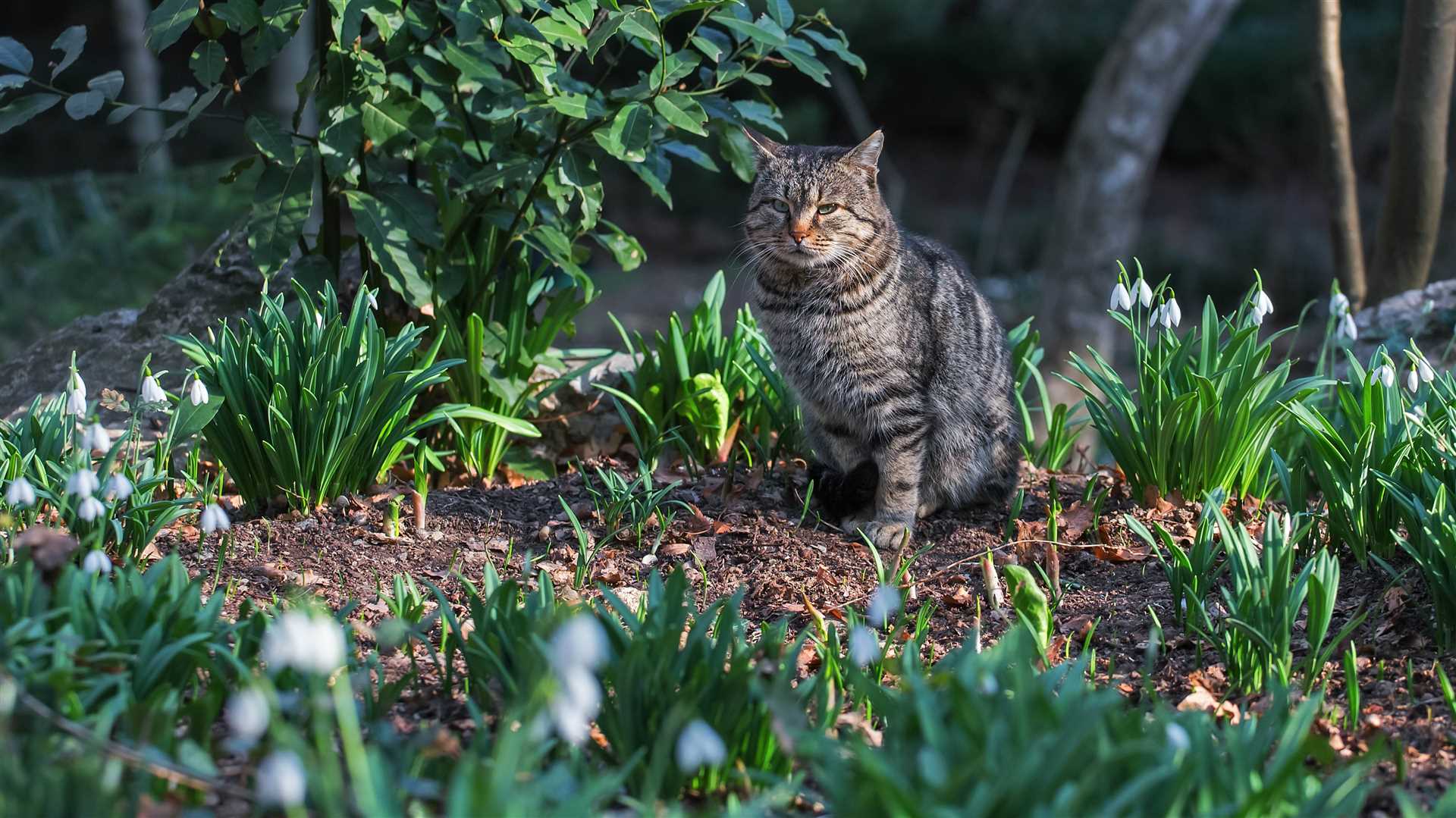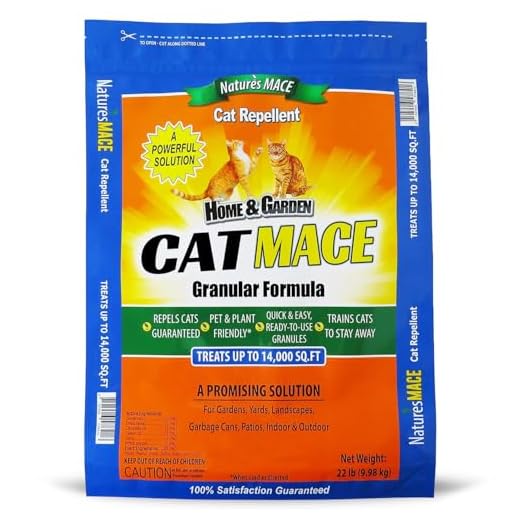



Planting specific herbs like rosemary, lavender, or citronella can create an unwelcoming atmosphere for felines. Their strong scents often repel curious noses.
Installing physical barriers, such as chicken wire or decorative fencing, can discourage exploration. Ensure these obstacles are tall enough to prevent jumping or climbing.
Utilizing motion-activated sprinklers adds an element of surprise. A sudden burst of water can make any adventurous visitor think twice before returning.
Consider adding citrus peels or vinegar-soaked rags around the perimeter. The sharp aroma is often disliked by most whiskered wanderers.
Creating a designated area with sand or gravel can provide an appealing alternative for those looking for a litter spot. This can help divert attention from your cherished plants.
Regularly changing up the strategies keeps them guessing. By mixing methods, you can stay one step ahead of those sneaky four-legged intruders.
Choosing the Right Plants to Deter Cats

Opt for strong-scented herbs like lavender, rosemary, and rue. These fragrances are unappealing to felines but delightful for humans. Planting these around the perimeter creates a natural barrier that can discourage wandering whiskers.
Spiky Plants
Incorporate thorny species such as barberry and holly. Their sharp features make them less inviting for curious paws. Position these strategically to protect vulnerable areas.
Catnip Alternatives

Avoid catnip if the goal is to prevent visits. Instead, try planting citronella or lemongrass. These options provide aromatic benefits while keeping unwanted visitors at bay.
If accidents happen, and your belongings need attention, check out this guide on how to clean cat pee from a mattress.
Implementing Physical Barriers to Protect Your Garden
Installing a fence around the perimeter creates a solid boundary. I recommend a height of at least four feet to prevent jumping. Opt for a material that is difficult to climb, such as wood or vinyl, with no gaps larger than four inches.
Add a top barrier, like an angled extension or a roller bar, to stop any determined climbers. This makes it harder for intruders to scale the fence easily.
For those with smaller plots, consider using decorative garden netting or chicken wire. Place it around vulnerable plants to deter unwanted visitors from digging or lounging.
Creating a physical barrier with raised beds can also be effective. Building beds at least 12 inches off the ground adds an additional layer of difficulty for any wandering souls.
Planting thorny shrubs or installing prickly materials along the edges can serve a dual purpose–adding beauty while providing a natural deterrent. Options like barberry or holly are excellent choices.
Utilizing motion-activated sprinklers can be a surprising and effective method. The sudden burst of water can startle and repel any curious intruders.
Incorporating garden furniture or decorations can disrupt paths, making it less appealing for strays to roam freely. Strategically placed obstacles can create a less inviting environment.
Utilizing Natural Repellents for Feline Deterrence
Consider using citrus peels, such as orange or lemon, scattered around to create an unpleasant environment for intruders. The strong scent deters many furry visitors. Additionally, vinegar diluted with water can be sprayed in specific areas; its aroma is off-putting and discourages unwanted guests.
Another option involves using coffee grounds. Cats generally dislike the smell, so sprinkling used grounds throughout the space may help keep them away. Similarly, dried herbs like rosemary and lavender can be effective; their fragrances are pleasant to humans but can repel curious noses.
Creating a mixture of water and essential oils, like eucalyptus or peppermint, provides a natural deterrent. Spraying this solution in targeted areas can reinforce boundaries. A homemade repellent with cayenne pepper mixed with water may also be beneficial; the spicy scent is a strong aversion for many felines.
Lastly, consider planting rue or coleus canina, known for their ability to repel. Placing these plants strategically can enhance the protective measures in place. Utilize these natural solutions to promote a peaceful coexistence with your outdoor space.
Planting specific herbs like rosemary, lavender, or citronella can create an unwelcoming atmosphere for felines. Their strong scents often repel curious noses.
Installing physical barriers, such as chicken wire or decorative fencing, can discourage exploration. Ensure these obstacles are tall enough to prevent jumping or climbing.
Utilizing motion-activated sprinklers adds an element of surprise. A sudden burst of water can make any adventurous visitor think twice before returning.
Consider adding citrus peels or vinegar-soaked rags around the perimeter. The sharp aroma is often disliked by most whiskered wanderers.
Creating a designated area with sand or gravel can provide an appealing alternative for those looking for a litter spot. This can help divert attention from your cherished plants.
Regularly changing up the strategies keeps them guessing. By mixing methods, you can stay one step ahead of those sneaky four-legged intruders.
Choosing the Right Plants to Deter Cats

Opt for strong-scented herbs like lavender, rosemary, and rue. These fragrances are unappealing to felines but delightful for humans. Planting these around the perimeter creates a natural barrier that can discourage wandering whiskers.
Spiky Plants
Incorporate thorny species such as barberry and holly. Their sharp features make them less inviting for curious paws. Position these strategically to protect vulnerable areas.
Catnip Alternatives

Avoid catnip if the goal is to prevent visits. Instead, try planting citronella or lemongrass. These options provide aromatic benefits while keeping unwanted visitors at bay.
If accidents happen, and your belongings need attention, check out this guide on how to clean cat pee from a mattress.
Implementing Physical Barriers to Protect Your Garden
Installing a fence around the perimeter creates a solid boundary. I recommend a height of at least four feet to prevent jumping. Opt for a material that is difficult to climb, such as wood or vinyl, with no gaps larger than four inches.
Add a top barrier, like an angled extension or a roller bar, to stop any determined climbers. This makes it harder for intruders to scale the fence easily.
For those with smaller plots, consider using decorative garden netting or chicken wire. Place it around vulnerable plants to deter unwanted visitors from digging or lounging.
Creating a physical barrier with raised beds can also be effective. Building beds at least 12 inches off the ground adds an additional layer of difficulty for any wandering souls.
Planting thorny shrubs or installing prickly materials along the edges can serve a dual purpose–adding beauty while providing a natural deterrent. Options like barberry or holly are excellent choices.
Utilizing motion-activated sprinklers can be a surprising and effective method. The sudden burst of water can startle and repel any curious intruders.
Incorporating garden furniture or decorations can disrupt paths, making it less appealing for strays to roam freely. Strategically placed obstacles can create a less inviting environment.
Utilizing Natural Repellents for Feline Deterrence
Consider using citrus peels, such as orange or lemon, scattered around to create an unpleasant environment for intruders. The strong scent deters many furry visitors. Additionally, vinegar diluted with water can be sprayed in specific areas; its aroma is off-putting and discourages unwanted guests.
Another option involves using coffee grounds. Cats generally dislike the smell, so sprinkling used grounds throughout the space may help keep them away. Similarly, dried herbs like rosemary and lavender can be effective; their fragrances are pleasant to humans but can repel curious noses.
Creating a mixture of water and essential oils, like eucalyptus or peppermint, provides a natural deterrent. Spraying this solution in targeted areas can reinforce boundaries. A homemade repellent with cayenne pepper mixed with water may also be beneficial; the spicy scent is a strong aversion for many felines.
Lastly, consider planting rue or coleus canina, known for their ability to repel. Placing these plants strategically can enhance the protective measures in place. Utilize these natural solutions to promote a peaceful coexistence with your outdoor space.
Planting specific herbs like rosemary, lavender, or citronella can create an unwelcoming atmosphere for felines. Their strong scents often repel curious noses.
Installing physical barriers, such as chicken wire or decorative fencing, can discourage exploration. Ensure these obstacles are tall enough to prevent jumping or climbing.
Utilizing motion-activated sprinklers adds an element of surprise. A sudden burst of water can make any adventurous visitor think twice before returning.
Consider adding citrus peels or vinegar-soaked rags around the perimeter. The sharp aroma is often disliked by most whiskered wanderers.
Creating a designated area with sand or gravel can provide an appealing alternative for those looking for a litter spot. This can help divert attention from your cherished plants.
Regularly changing up the strategies keeps them guessing. By mixing methods, you can stay one step ahead of those sneaky four-legged intruders.
Choosing the Right Plants to Deter Cats

Opt for strong-scented herbs like lavender, rosemary, and rue. These fragrances are unappealing to felines but delightful for humans. Planting these around the perimeter creates a natural barrier that can discourage wandering whiskers.
Spiky Plants
Incorporate thorny species such as barberry and holly. Their sharp features make them less inviting for curious paws. Position these strategically to protect vulnerable areas.
Catnip Alternatives

Avoid catnip if the goal is to prevent visits. Instead, try planting citronella or lemongrass. These options provide aromatic benefits while keeping unwanted visitors at bay.
If accidents happen, and your belongings need attention, check out this guide on how to clean cat pee from a mattress.
Implementing Physical Barriers to Protect Your Garden
Installing a fence around the perimeter creates a solid boundary. I recommend a height of at least four feet to prevent jumping. Opt for a material that is difficult to climb, such as wood or vinyl, with no gaps larger than four inches.
Add a top barrier, like an angled extension or a roller bar, to stop any determined climbers. This makes it harder for intruders to scale the fence easily.
For those with smaller plots, consider using decorative garden netting or chicken wire. Place it around vulnerable plants to deter unwanted visitors from digging or lounging.
Creating a physical barrier with raised beds can also be effective. Building beds at least 12 inches off the ground adds an additional layer of difficulty for any wandering souls.
Planting thorny shrubs or installing prickly materials along the edges can serve a dual purpose–adding beauty while providing a natural deterrent. Options like barberry or holly are excellent choices.
Utilizing motion-activated sprinklers can be a surprising and effective method. The sudden burst of water can startle and repel any curious intruders.
Incorporating garden furniture or decorations can disrupt paths, making it less appealing for strays to roam freely. Strategically placed obstacles can create a less inviting environment.
Utilizing Natural Repellents for Feline Deterrence
Consider using citrus peels, such as orange or lemon, scattered around to create an unpleasant environment for intruders. The strong scent deters many furry visitors. Additionally, vinegar diluted with water can be sprayed in specific areas; its aroma is off-putting and discourages unwanted guests.
Another option involves using coffee grounds. Cats generally dislike the smell, so sprinkling used grounds throughout the space may help keep them away. Similarly, dried herbs like rosemary and lavender can be effective; their fragrances are pleasant to humans but can repel curious noses.
Creating a mixture of water and essential oils, like eucalyptus or peppermint, provides a natural deterrent. Spraying this solution in targeted areas can reinforce boundaries. A homemade repellent with cayenne pepper mixed with water may also be beneficial; the spicy scent is a strong aversion for many felines.
Lastly, consider planting rue or coleus canina, known for their ability to repel. Placing these plants strategically can enhance the protective measures in place. Utilize these natural solutions to promote a peaceful coexistence with your outdoor space.











